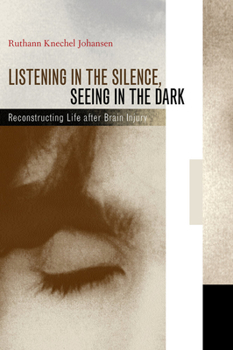Listening in the Silence, Seeing in the Dark: Reconstructing Life after Brain Injury
Select Format
Select Condition 
Book Overview
Traumatic brain injury can interrupt without warning the life story that any one of us is in the midst of creating. When the author's fifteen-year-old son survives a terrible car crash in spite of massive trauma to his brain, she and her family know only that his story has not ended. Their efforts, Erik's own efforts, and those of everyone who helps bring him from deep coma to new life make up a moving and inspiring story for us all, one that invites us to reconsider the very nature of "self" and selfhood.
Ruthann Knechel Johansen, who teaches literature and narrative theory, is a particularly eloquent witness to the silent space in which her son, confronted with life-shattering injury and surrounded by conflicting narratives about his viability, is somehow reborn. She describes the time of crisis and medical intervention as an hour-by-hour struggle to communicate with the medical world on the one hand and the everyday world of family and friends on the other. None of them knows how much, or even whether, they can communicate with the wounded child who is lost from himself and everything he knew. Through this experience of utter disintegration, Johansen comes to realize that self-identity is molded and sustained by stories.
As Erik regains movement and consciousness, his parents, younger sister, doctors, therapists, educators, and friends all contribute to a web of language and narrative that gradually enables his body, mind, and feelings to make sense of their reacquired functions. Like those who know and love him, the young man feels intense grief and anger for the loss of the self he was before the accident, yet he is the first to see continuity where they see only change. The story is breathtaking, because we become involved in the pain and suspense and faith that accompany every birth. Medical and rehabilitation professionals, social workers, psychotherapists, students of narrative, and anyone who has faced life's trauma will find hope in this meditation on selfhood: out of the shambles of profound brain injury and coma can arise fruitful lives and deepened relationships.
Keywords: narrative; selfhood; therapy; traumatic brain injury; healing; spirituality; family crisis; children
Ruthann Knechel Johansen, who teaches literature and narrative theory, is a particularly eloquent witness to the silent space in which her son, confronted with life-shattering injury and surrounded by conflicting narratives about his viability, is somehow reborn. She describes the time of crisis and medical intervention as an hour-by-hour struggle to communicate with the medical world on the one hand and the everyday world of family and friends on the other. None of them knows how much, or even whether, they can communicate with the wounded child who is lost from himself and everything he knew. Through this experience of utter disintegration, Johansen comes to realize that self-identity is molded and sustained by stories.
As Erik regains movement and consciousness, his parents, younger sister, doctors, therapists, educators, and friends all contribute to a web of language and narrative that gradually enables his body, mind, and feelings to make sense of their reacquired functions. Like those who know and love him, the young man feels intense grief and anger for the loss of the self he was before the accident, yet he is the first to see continuity where they see only change. The story is breathtaking, because we become involved in the pain and suspense and faith that accompany every birth. Medical and rehabilitation professionals, social workers, psychotherapists, students of narrative, and anyone who has faced life's trauma will find hope in this meditation on selfhood: out of the shambles of profound brain injury and coma can arise fruitful lives and deepened relationships.
Keywords: narrative; selfhood; therapy; traumatic brain injury; healing; spirituality; family crisis; children
Format:Hardcover
Language:English
ISBN:0520231147
ISBN13:9780520231146
Release Date:March 2002
Publisher:University of California Press
Length:248 Pages
Weight:1.10 lbs.
Dimensions:0.9" x 6.3" x 9.2"
Customer Reviews
2 ratings
Well written and touching story
Published by Thriftbooks.com User , 14 years ago
The author provided a thorough and very well-written account of the traumatic situation that her family found themselves in. The book was eye-opening and a pleasure to read. It is incredible how accomplished the author's son has become following such a terrifying brain injury. This book will give hope to others who are unfortunately suffering from a similar situation. An important message that is conveyed throughout is that one MUST be their child's voice and advocate when a child is immersed in a world of medical control and jargon. The amazing recovery of the author's son is undoubtedly due to the insistent, undying motivation from his parents.
Very good read
Published by Thriftbooks.com User , 15 years ago
I am a survivor of a horrific TBI. I have been reading many text books and personal stories in the last 5 years. I am 21 years post. I have no memory of my accident and even months following. Reading this book made me want to cry at times for my mom. This is a good book because it shows the importance of family. I am better off than what was ever expected of me. This is one of my favorite personal story books on TBI. (traumatic brain injury for all you "outsiders.")






